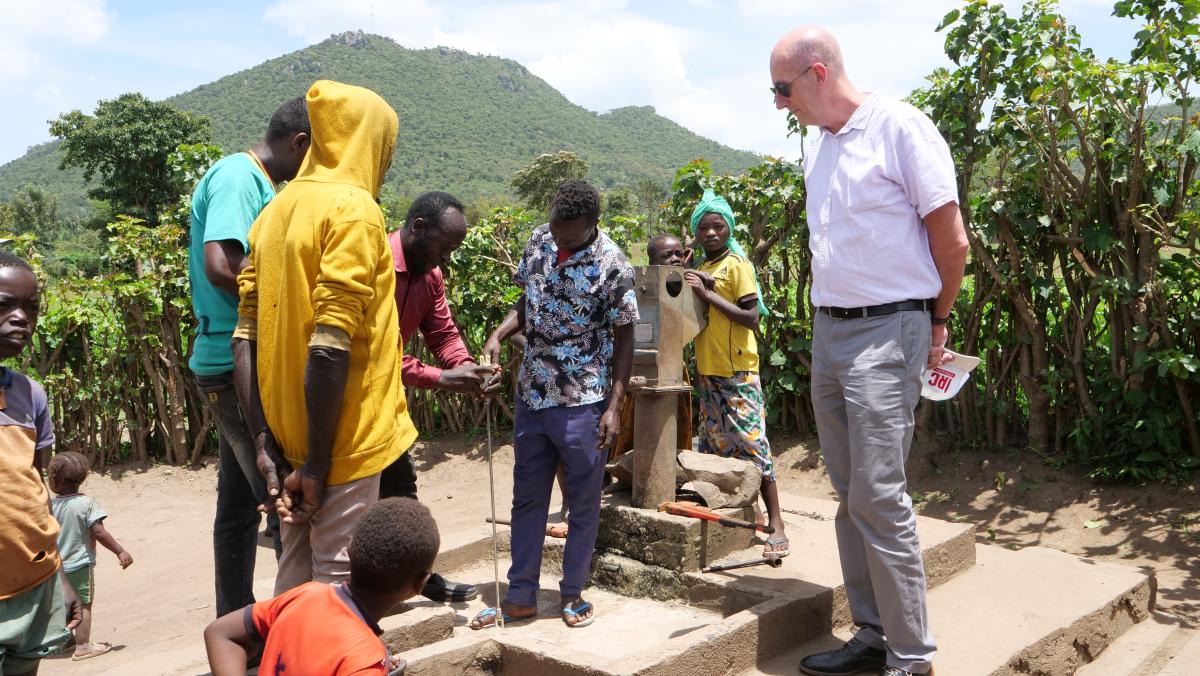During a visit to South Ari district, the IRC WASH delegation confirmed their commitment to help the district achieve Sustainable Development Goal 6.
Published on: 06/10/2022

Patrick Moriarty visiting a water maintenance service in one of the water schemes in South Omo Zone Photo credit: Tsegaye Yeshiwas
South Ari is a district rich in natural resources. Any visitor to the area will be delighted by the mountains surrounded by lush vegetation. The district's mountains offer a source of water, and streams flow downward with abundance. However, the district's safe drinking water coverage is not as extensive as nature intended with only 32% coverage. This is why IRC WASH is collaborating with local partners to support the district’s efforts to build strong water, sanitation and hygiene (WASH) systems.
From September 22 – 25, 2022, Dr. Patrick Moriarty, Chief Executive Officer of IRC WASH, and Wambui Gichuri, a member of IRC’s Supervisory Board, visited the district with the country office team and saw IRC’s support in the district.
During the visit, there was a discussion with the district chief administrator, Gidalk Alkimi, and water, health, and education office heads. "Before IRC WASH started supporting the district, all non-profit groups had been involved mainly in the construction of water facilities, but there was no intervention about proper water scheme administration and systems strengthening," said Ajele Getu, the district’s Water, Mine, and Energy Office vice-head. He stated that there was a significant disparity in the distribution of water among kebeles and that there were no established water user associations or federations or qualified WASHCOs and caretakers at the kebele level. However, thanks to IRC’s assistance these deficiencies were remedied. The main support provided was on the development of district WASH master plans, a resource mobilisation strategy, a water safety plan and strengthening monitoring and maintenance.
According to Ajele, since IRC’s support, the district has shown progress in recognising WASHCOs and federations, continually trains WASHCOs, federations, and caretakers, has established a monthly reporting system between the district and kebeles, conducts a quarterly learning alliance meeting, updates the water scheme status on a monthly basis through mWater, and engages with stakeholders at the district and kebele level. Due to these engagements, the woreda’s capital budget has increased every year and water tariff collection is increasing, enabling fair distribution of water among kebeles.
Though there has been success across various WASH aspects of the district, there are still issues that the district is dealing with. The main problems include a lack of budget to keep the plan on track, a lack of transportation (motorbikes and cars), a lack of maintenance tools and spare parts, and price increases for maintenance materials.
During the discussion with the district, a new option for improving the sustainability of water schemes, such as bringing in the private sector for long-term maintenance, was considered. They will endeavour to professionalise maintenance services with the help of microenterprises that are currently operating in the district. And the capacity of caretakers will be strengthened.
The team also paid a visit to the Gazer town Water Supply Utility office. Since it was established in 2019, the office has made significant progress. We noticed a large sheet of paper on the office wall which is the town utility's plan for the 2014 Ethiopian fiscal year which includes the number of people to be serviced, the amount of tariff to be collected, and the total amount of budget required. The town's water service status was 60.5% in 2013 Ethiopian fiscal year, with plans to raise it to 67.5% in 2014. Mantegaftot Negash, the utility's acting head, explained to the delegation what they were doing. He said that the number of personnel in the office has increased from three to ten, and he believes that the utility office has expanded in terms of services since it started operating.
To give some assistance in the short term, IRC donated a new motorcycle to the district to assist them in resolving the transportation issues, and they were appreciative of this. However, IRC has also committed for the long term. IRC WASH, the district administration, and the WASH implementing partners in the district signed a Memorandum of Understanding (MoU) to assist South Ari district in meeting the Sustainable Development Goal 6 targets by promoting the execution of the district WASH master plan as well as the resource mobilisation strategy for long-term water, sanitation, and hygiene service delivery.